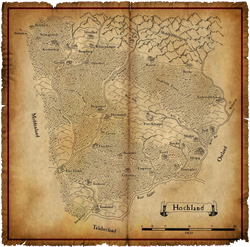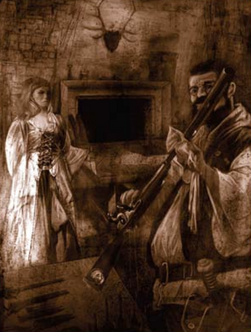"Hochland was once the Light of the East. Now its just embers."
- —A Hergig refugee

The Banner of Hochland
The Grand Barony of Hochland is a major and founding Imperial Province that lies to the north-central lands of the Empire of Man. The lands of Hochland, like its neighbor Ostland, has within its boundaries parts of the Middle Mountains and vast tracts of untamed wilderness. Because of this, is often compared to its larger and wealthier northern neighbor. "Ostland's little brother" is a term often used, although not in Hochland.[1a]
Despite their backwards reputation, the people of Hochland are no less sturdy nor skilled than their neighbors in terms of military capability, with many of the best archer and marksmen regiments with the Empire's military having been born within the province itself. Like their brethren in neighboring provinces, the Hochland people are also quite resourceful, a trait that is often learned from a young age to all sons of a Hochland family. As well as being resourceful, the people of Hochland are also amazing hunters and trackers, a trait that originated from their former tribal traditions as the Cherusen people.[1a]
The Land

The forested woodlands of the hunter-province of Hochland
Comprising the eastern end of the Drakwald Forest, Hochland is a heavily wooded province bounded by the Middle Mountains in the to the north-east and the waters of the Drakwasser, Talabec and Wolfs Run rivers on the west, south and east, respectively. West beyond a strip of Hochland on the left banks of the Drakwasser lies Middenland, and Talabecland is to the southern banks of the Talabec River, while Ostland girds Hochland's north-eastern borders. Deep within Hochland are the Weiss Hills, a treacherous mixture of hill country and fens watched over by lonely fort of Schippel.[1a]

A map of Hochland
Though mostly covered in forest, the farms along the river banks and around the villages are fertile thanks to the many rivers and streams that flow south from the uplands of the Middle Mountains. This makes Hochland self-sufficient in food, although luxury victuals have to be imported from Middenheim and Talabheim. Heavy snows in the winter and rains in the spring make Hochland towns susceptible to flooding, though the prior ruling house of the Tussen-Hochen invested heavily in dikes to control the flood water.[1a]
Heading north from the Talabec, the land rises gradually to the massifs of the Middle Mountains, forbidding peaks claimed by many, but wholly controlled by none. Three main roads wind through the province: the Old Forest Road, the North Road, and the New Road. The Old Forest Road runs from Middenheim and Talabheim and beyond, the Hochland portion leading from Krudenwald near the shrine-town of Gruyden before coming to the Talabec Ferry.[1a]
The North Road carries traffic from Wolfenburg in Ostland to the town of Krudenwald, while the New Road opens the way from the lands of southern Ostland to the town of Delbez and then to the capital of Altdorf. These were built by prior Counts as part of a plan to develope Hochland's economy through trade, tolls, and tourism. Hochland's main trade is timber and woodcrafts. Thick woods of oak and sycamore grow in the south, while pines and cedar are in the north. Guilds of lumbermen cut down the trees, trim the trunks and float the logs downstream to mills in the settlements of Esk, Bergendorf, Krudenwald, and Hergig.[1a]
The logs are then bought by brokers, loaded on barges, and shipped out. Woodsmen in the south were awaiting the construction of a mill along the Talabec by Count Aldebrand Ludenhof, so they won't have to make a delay in shipping the goods to Ahlenhof in Middenland, but that has since been delayed. The mill in Hergig is a recent and quite controversial development, for the Elector Count of Ostland felt it encouraged illegal logging in his lands and demanded tolls for lumber floating down the Wolfs Run River. Deep within the forests lies the Weiss Hills, a sparsely inhabited area of moorlands and low hills that are mainly traveled by poachers and licensed trappers and hunters. Much of the land is a royal demesne of the Counts of Hochland, watched over by the warden of Fort Schippel.[1a]
Inhabitants
"We survive, and where there is survival, there is hope."
- —Elector Count Aldebrand Ludenhof

In Hochland, they say, a man may love his Longrifle more than his wife.
Hochlanders are for the most part descended from the proud Cherusen tribe. Having mingled for some time within the Taleutens of Talabecland, the tribe eventually left the lands of the Great Forest and migrated to a small area near the Middle Mountains. Amidst verdant woods filled by game, these people have found the home they've always wanted. Less warlike than their neighbours, they contented themselves on hunting, fishing, and singing praises to Taal and Rhya.[1a]
When other Human tribes or warbands of Orcs and Beastmen would raid, the early Hochlanders would melt back into their forest, using deadly ambush and warcraft to defeat their enemies. By the time of Sigmar, the Hochlanders had become skilled scouts and skirmishers, and maintained very good relations with Sigmar's own Unberogen tribe, during the rule of his father. When the barbaric Norsii tribes began invading the lands of the Cherusens and Taleutens, King Bjorn rode forth to aid his fellow rulers against the Chaos-worshipers. Though the valiant king of the Unberogen died fighting the Norsii hosts, he had driven them back from the lands of the Cherusens, thus, King Aloysis became a fast and loyal friend to Bjorn's son, Sigmar, and contributed greatly in his wars to unite the tribes. Thus, Sigmar made Aloysis the first Count of the Cherusens.[1a]
Hochland is a small but proud province, famed for its hunters and trackers. Their traditional dish of fired venison have been exported across the Empire, but gourmands say it still tastes best cooked under the night sky of Hochland. At their best, Hochlanders are loyal, valiant, and adaptable. Modern Hochlanders are amongst the most open minded and friendly people in the Empire. With their lands being a crossroad for so much of the northern and eastern Empire, they have developed tolerance that is considered unusual everywhere else. Though mainly worshippers of Taal, Rhya, and of Sigmar, contact with travelers and merchants using the roads has made Ulric popular in the northeast, while Shallya has a strong cult. Contact with educated outsiders has led to a respect for intellectuals, so much so that the rulers of Hergig encouraged the founding of a private academy and even a small school of wizardry.[1a]
Recognizing their lands are unsuited to large-scale farming or cattle-raising, the people have done what they can to encourage others to visit and leave some of their money behind. Shrines to several cults can be found in most towns and villages, each claiming to be the site of a miracle and having blessed relics for sale. Fortified coaching inns sprang up along the roads for the convenience of travelers, though several had been bought by the rival Tunnelway and Wolf Runners coaching company. Fond of hunting in all its form, tales of the loyal friendship and jaunt ballads, Hochlanders are also known to be easily distracted by the prospect of little sport.[1a]
Some folk also whisper that their valiant nature is due in the most park from their naivety more than innate loyalty. Jokes about Hoclanders who love their bow or rifle more then their wives are common, though most are too rude to repeat. This dedication to marksmenship has resulted in the excellent Hochland long rifle regiments that have proved so useful in recent times. The Hochland spirit is said to resist the defeatism in all its form, "Even unto Death". In recent years however much as happened to change the normally optimistic, trusting Hochlander characters.[1a]
Province Statistics
- Official Name: The Grand Barony of Hochland
- Ruler: Elector Count Aldebrand Ludenhof[1a]
- Government: Feudal, with an assembly of barons, burghers, and churchmen[1a]
- Capital: Hergig[1a]
- Chartered Free Towns: None[1a]
- Major Exports: Timber, woodcrafts[1a]
Location of Importance
- Hergig - capital of Hochland and home to the Ludenhof family.[1a]
- Esk - a small mining and logging village at the foothills of the Middle Mountains.[1a]
- Gruyden - a small shrine village dedicated to the worship of many Imperial dieties.[1a]
